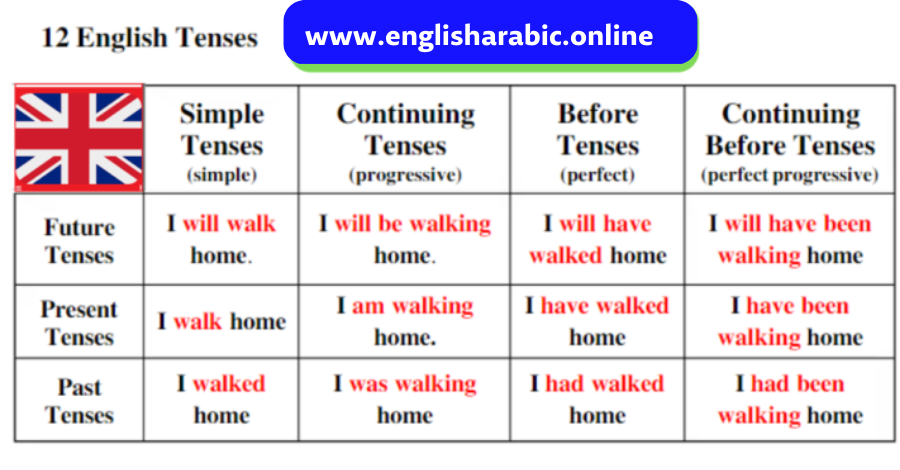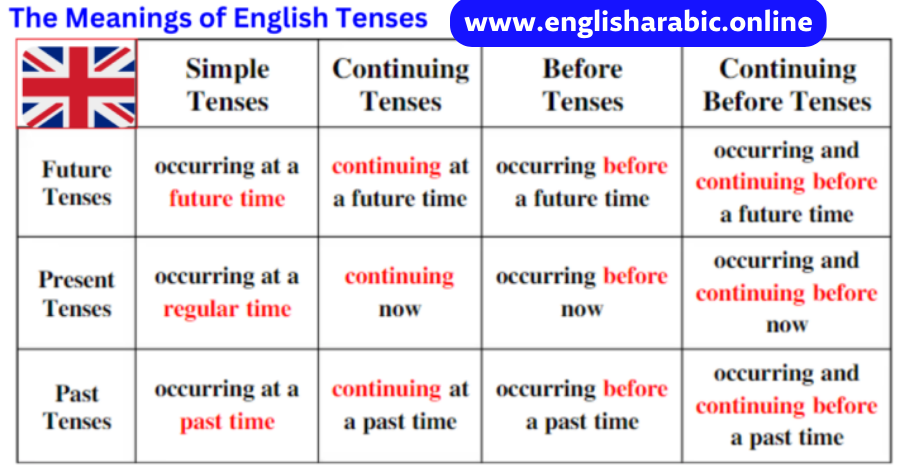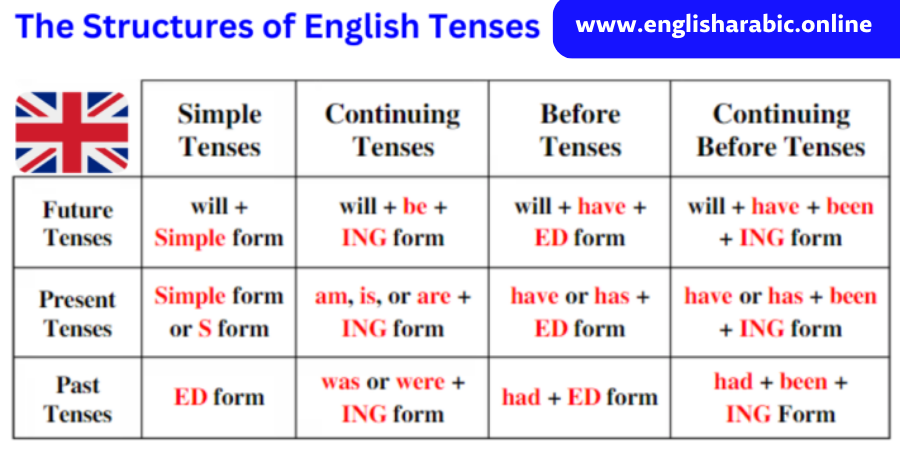Learn English tenses -Future Tense
FUTURE TENSE QUIZ
The English Tense System
The links below are to lessons for each of the 12 basic tenses.
In each lesson we look at two aspects of the tense:
- Structure: How do we make the tense?
- Use: When and why do we use the tense?
Some lessons look at additional aspects, and most of them finish with a quiz to check your understanding.
Present Tense
Present Continuous Tense
Present Perfect Tense
Present Perfect Continuous Tense
Past Tense
Past Continuous Tense
Past Perfect Tense
Past Perfect Continuous Tense
Future Tense
Future Continuous Tense
Future Perfect Tense
Future Perfect Continuous Tense
Tenses
We use different tenses to describe the time that the verb refers to.



There are many ways to talk about the future in English. “Will” and “going to” are both used to talk about events happening at specific times in the future, but they are often used to express different meanings. Sometimes, the simple present or present continuous tenses are used to talk about the future.
Will
To make the simple future with “will,” put “will” between a subject and the base form of a verb:
| Subject | Will | Base Form of Verb | Rest of Sentence |
| I, you, he, she, it, they, we | will | go | to the movies. |
Note: The contraction “’ll,” as in “I’ll,” “she’ll,” and “he’ll” is vastly more common in spoken English than saying “will.” “Won’t” is the most common spoken form of “will not.”
Going To
To make the simple future with “going to,” put the subject, then a conjugated “to be” verb, then “going to” and the base form of a verb:
| Subject | Present Tense “To Be” Verb | Going To | Base Form of Verb | Rest of Sentence |
| I | am | going to | leave | before the guests arrive. |
| he/she/it | is | going to | leave | before the guests arrive. |
| They, we, you | are | going to | leave | before the guests arrive. |
Note: “Going to” is often pronounced like “gonna” in spoken English.
Will: Voluntary Actions, Promises, Requests, and Refusals
“Will” often expresses that an action will be done voluntarily in the future. It is also the most common way to ask someone to do something.
- I’ll go to the doctor with you, if you want.
- Will you help me with the laundry?
- Jamie will call you back tomorrow.
- I’ll give you the report in the morning, I swear!
- I will never forget what you did for me.
- Marian won’t need a swimsuit in Alaska.
- Will you give me a hand with the groceries?
Will: Unplanned Decisions for the Future
When you want to express that you just made a decision to do something, use “will.”
- Situation: The doorbell rings.
- Response: “I’ll get it!”
- Situation: A street vendor says that he’s selling flowers.
- Response: “I’ll take one!”
- Situation: Your roommate says you’re out of paper towels.
- Response: “I’ll get some when I go to the store today.”
Going To: Planned Future Events
Use “Going to” to express that an action will happen in the future has already been planned or intended.
- I’m going to take a trip to London this summer.
- Did you hear that Chris is going to get married?
- We’re going to play poker with our friends tonight.
- Are you going to finish that cake?
Going To: When Something is Just About to Happen
- Stand back! The bomb is going to explode!
- I’m going to be sick.
- If you don’t get in the car, I’m going to leave without you.
Will and Going to: Making Predictions
Sometimes, either “will” or “going to” can be used to make predictions about the future.
- The next president is going to be a woman.
- The next president will be a woman.
- The Orioles are going to win the World Series next year.
- The Orioles will win the world series next year.
It’s more common to use “will” than “going to” to make predictions based on belief about the future, rather than immediate, sensory evidence.
- I think he’ll make a great employee.
- You act like the world will end if you don’t get an A+.
- Humans will reach Mars within the next 100 years.
Use “going to” to make a future prediction based on signs and evidence in the present moment:
- Your parents are going to freak out when they see your tattoo.
- I feel sick. I think I’m going to throw up.
- The clouds have been gathering for hours. It’s going to rain soon.
- The score is 52-14. Our team is going to win!
Negative Statements
To make the negative with the simple future tenses:
add “not” before “going to”
add “not” after “will.” (the most common form is “won’t”)
- I am not going to be happy about this.
- She won’t come out of her room.
- They won’t be able to make it to the party.
- He is not going to drive anymore.
Question Forms
Information Questions about the Subject:
To make a question about the subject of a sentence, use a question word as the subject. The form is:
question word + will + main verb (base form) + rest of sentence
question word + “to be” verb + going to + main verb (base form) + rest of sentence
- ??? is going to travel to Mexico. –>
- Who is going to travel to Mexico?
- ??? people will need better healthcare. –>
- How many people will need better healthcare?
- ???’s teacher is going to dye her hair blue. –>
- Whose teacher is going to dye her hair blue?
Questions about the Verb or Words after the Verb:
To make a yes/no question about the verb or words after the verb with the future simple tense, put either the “will” or the “to be” verb before the subject:
Will + subject + verb + rest of sentence
“To be” verb + subject + going to + verb + rest of sentence
- Are you going to go to a doctor?
- Will you promise me that you won’t lie to me again?
- Will Ashley help me with my research?
- Is she going to take the job in Spain?
To make an open-ended question, put a question word (who, what, where, when, why, how) at the beginning of the sentence.
- Why are you going to go to a doctor?
- When will you promise me that you won’t lie to me again?
- How will Ashley help me with my research?
- What is she going to do in Spain?
Are you ready to see how well you know the Future Tense ?
Try this fun QUIZ .